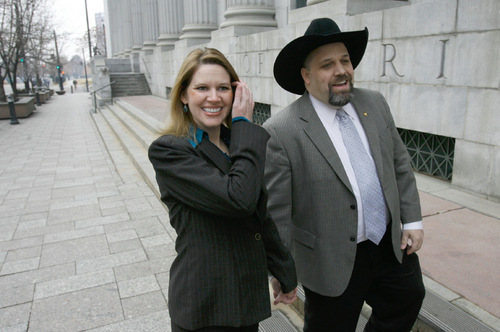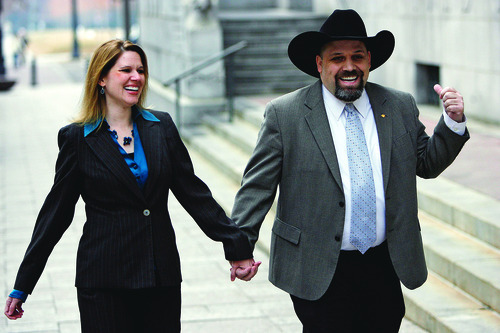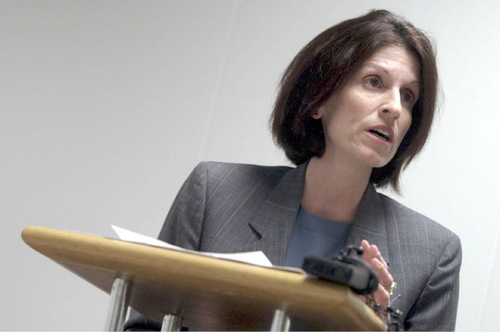This is an archived article that was published on sltrib.com in 2010, and information in the article may be outdated. It is provided only for personal research purposes and may not be reprinted.
In 2007, when Utah County businessman Rick Koerber was battling the Utah Department of Commerce during an investigation of his real estate investment business, he erected a series of billboards along Interstate 15, from Ogden to Payson
"Some things are true whether you believe them or not," said the billboards, while at the bottom, they read, "Annoying the socialists daily."
This year, when the department put together a public service campaign warning Utahns to beware of people seeking to defraud them, it sponsored billboards that mimicked Koerber's in design and read: "I'm your friend. I'm your neighbor. I'm a Con Man. Check before you invest."
It was a bit of a tweak back at Koerber and his very public and high-profile battle with the department over the state investigation that ultimately brought in federal agents and resulted in a 22-count indictment that could land Koerber in prison.
But the rancor is real, and now Koerber is trying to make his federal charges into a tribunal over the conduct of the department's executive director, Francine Giani, and state investigators in their probes of what the indictment says was a multimillion-dollar Ponzi scheme that ensnared dozens of Utahns.
The depth of Koeber's obsession with Giani is reflected in page after page of documents filed recently in a motion asking U.S. District Judge Ted Stewart to recuse himself from presiding over the case because of alleged discussions between Giani and Stewart. She strongly denies the accusation, but Stewart took no time in doing so on the same day the motion was filed, with the lack of lag time suggesting the extensive arguments related to Giani and her department's conduct were a bit of overkill.
But Marcus Mumford, Koerber's attorney, makes no apologies and said he intends to show that the federal government's case is based on a state investigation that he and Koerber see as deeply flawed and without merit.
"From the beginning of this case as a federal matter, it was presented as a joint matter between the Department of Commerce and the federal authorities," said Mumford. "And you cannot escape the conclusion that the federal authorities brought the same case the state authorities were trying to bring and failed to bring at the state level for lack of evidence."
For her part, Giani expresses a weariness at Koerber's constant attacks, saying that FBI and Internal Revenue Service agents investigated the case on their own for a year and a half after she approached them. She did so after what she believed was political interference in state regulators' pursuit of a lawsuit against Koerber.
"This is just another red herring in the sea of red herrings we will see over the next little while," she said recently.
For Koerber, the battle is personal and ideological.
—
Business model questioned • His run-ins with state regulators began in 2004 when he met with officials from the Division of Real Estate and other agencies in the Department of Commerce who were looking into a property transaction involving one of the students in Koerber's real estate investing seminars. Koerber's operation, gathered around the name FranklinSquires Cos., had made "a couple of hundred thousand bucks" after owning the property only for a day, Koerber said in an April 2009 interview before he was indicted.
Regulators found nothing illegal about the transaction, but still told him, according to Koerber, "We haven't found it yet but I'm sure we will. … Your business model is illegal. I don't have evidence of it, but we're going to find it."
What Koerber described as this first brush with Utah regulators came at a time when he was developing his "Free Capitalist Project," which included a small weekly publication, then a radio program on K-TALK and an organization that created literature and conducted seminars promoting unfettered capitalism and warned against creeping socialism.
"I saw the [choices] in our society becoming increasingly either capitalism or socialism," said Koerber in 2009.
Koerber then and now links his view of unfettered capitalism to what he describes as an overzealous state and federal effort to make a case against his businesses, which he insists were lawfully run, based every step of the way on advice from attorneys.
"It started this kind of perpetual investigation that rolled from one division to the other, and in the meantime the regulators started spreading such horrible gossip about what we did that it was hurting our business," Koerber said in 2009.
To fight back, Koerber erected the Free Capitalist billboards in 2007 that were aimed at state investigators and that also advertised his radio show.
"I started going on the radio and calling these guys out," Koerber said. "People noticed I started jabbing the Department of Commerce. I started jabbing Francine Giani because I asked for a meeting with [her] and she wouldn't meet with me."
Koerber called investigators "commissars," the title for Soviet Communist Party officials responsible for political education to ensure loyalty.
"Oh man, it pissed them off," Koerber said of state regulators, who he said demanded he take down the billboards, which prompted Koerber to resist, go on the radio and rant more about the government trying to stifle his speech.
Koerber also got himself legal and political muscle.
—
Getting lawmaker help • His relationship with Utah's Cleon Skousen, the arch-conservative and noted anti-communist, led to a phone call in 2005 with Russell Skousen, Cleon's nephew, who was executive director of the Utah Department of Commerce before Giani. Russell Skousen resigned shortly thereafter and became FranklinSquires Cos. in-house lawyer, where part of his job was to hold off the same regulators whom Skousen previously had supervised.
Koerber also convinced state Rep. Carl Wimmer, R-Herriman, to intercede on his behalf. Wimmer went to then-Gov. Jon Huntsman Jr. to urge that he fire Giani. And Wimmer arranged for Koerber to discuss his situation with Attorney General Mark Shurtleff during breakfast at a Mimi's Cafe in Sandy.
Koerber and those surrounding him also began to record calls made to or received from state investigators.
Those investigators had come to believe that Koerber was operating a Ponzi scheme in which money from new investors was used to pay off earlier investors, and had violated securities law. In fact, the federal indictment alleges that Koerber used about $50 million of the $100 million the companies took in to pay off investors and make the operation appear successful, when it had not made a profit in 2005-2007.
Shurtleff's office refused to file a lawsuit on behalf of the Department of Commerce against Koerber, leading to accusations of political interference. A copy of a memo that federal investigators wrote also shows that state Sen. Steve Urquhart had suspicions that Shurtleff was failing to prosecute cases after receiving political donations. (Koerber says he made no donations to Shurtleff. A check of campaign records appears to support Koerber's assertion.) Shurtleff said at the time there was insufficient evidence and denied any quid pro quo.
Giani then took the case to federal authorities.
Koerber and Mumford cite various statements and documents they claim show that the state had no case. They also cite a 2008 legislative audit of the department's Division of Securities undertaken in part at the urging of Wimmer, who claimed misconduct in the Koerber investigation.
The Koerber case was one of three on which auditors focused. The results found that the division's director, Wayne Klein, had engaged in "questionable actions," including "inappropriate publicity, emphasis on punishment rather than compliance, the use of intimidation tactics, violating terms of settlement agreements, failure to notify those being investigated, and inconsistent case management." Klein resigned as a result of the audit.
The audit also found that Giani had lost the confidence of some division staff members when she did not maintain confidentiality about their complaints regarding Klein, did not act on concerns about ethical or procedural problems in the division and was hostile toward those who approached her about problems.
Koerber and Mumford cite the audit findings as proof of what they say was misconduct that tainted the state investigation. But the audit does not directly address any specific evidence gathering by the state.
—
Keeping up the battle • Their assertions aside, attorney Mark Pugsley, who was a member of the Division of Securities' advisory board, said Koerber's focus on Giani and the state investigation is misguided.
"The question of whether or not Mr. Koerber ran a Ponzi scheme has nothing to do with whether the Division of Securities was mismanaged," said Pugsley, chairman of the Securities Litigation Group at the Salt Lake City law firm of Ray Quinney & Nebeker. "If anything, the turmoil at the division benefited him by permitting the scheme to go on for much longer."
For Koerber, the battle has not ended. On Jan. 20 he relaunched his "Free Capitalist Project" radio show, though this time with podcasts distributed on his website and through Apple's iTunes.
Giani was still on his mind. Koerber said he was broadcasting from his "bunker in the Rocky Mountain West" and that, "We have a lot of controversy here in Utah.
"I suppose I could send a shout-out to Francine. Hey, Francine!"









